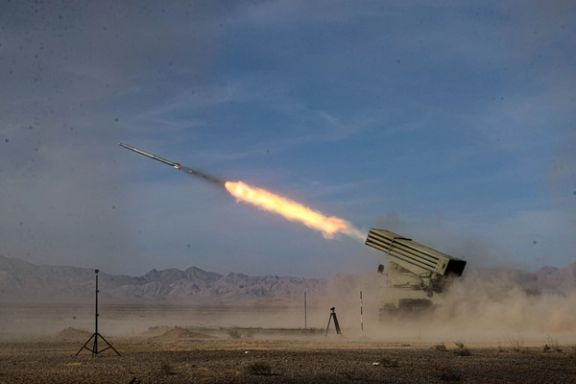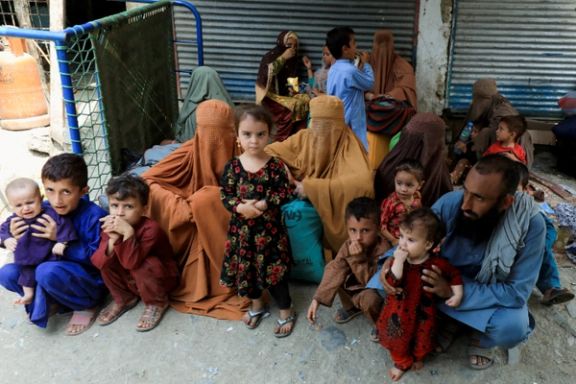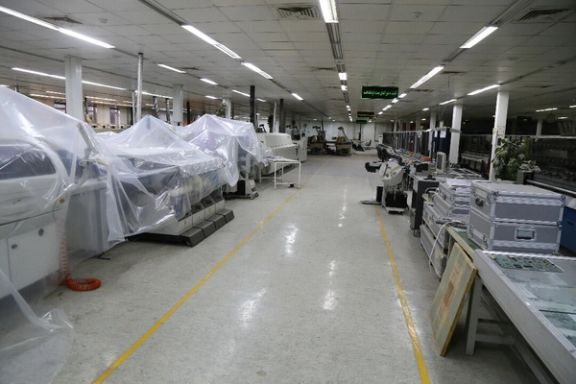UK Prepares Evacuation As Tensions Rise In Middle East

The UK Royal Marines are prepared to oversee a major evacuation of British nationals from the Middle East if Iran decides to launch a missile strike on Israel.

The UK Royal Marines are prepared to oversee a major evacuation of British nationals from the Middle East if Iran decides to launch a missile strike on Israel.
According to a report from the Daily Mail, commandos have been doing reconnaissance along the Lebanese coast in preparation for a possible maritime rescue operation.
Defense Secretary Grant Shapps told the Mail that the UK “stands ready” to help any Britons who find themselves stuck in the area. The Foreign Office has recommended that all UK citizens leave Lebanon as a precaution.
US President Joe Biden on Friday issued a warning about a significant risk of attack "sooner than later."
Meanwhile, there are reports suggesting that Iran has advised against US intervention in the region. The evacuation plan, known as Operation Meteoric, will be led by the UK's 'Green Berets' with assistance from the Royal Navy and Royal Air Force.
A team of Marines from 30 Commando has been sent to the area for Operation Meteoric, drawing parallels to the historic Operation Dynamo from 1940, which evacuated Allied soldiers from Dunkirk.
Tensions escalated following an attack on Iran's consulate in Damascus on April 1, reportedly carried out by Israel. Iran has repeatedly threatened retaliation either directly from its territory or deploying its proxy forces in the region.
Recent reports indicate that Iran may use drones, cruise missiles, and ballistic missiles, posing a threat to civilian air travel.
In a worst-case scenario, civilians stranded on beaches could be rescued by the UK’s Royal Fleet Auxiliary ships in the eastern Mediterranean, supported by RAF Typhoon jets stationed in Cyprus.
Shapps assured that the UK is prepared to help its citizens in the midst of rising tensions, even though details of the plans are classified for safety.
Follow developments on Iran International's Live coverage of ongoing tensions between Iran and Israel.

In calls with Egyptian and Jordanian foreign ministers on Friday, US Secretary of State Antony Blinken discussed the recent escalation in the Middle East amid Iran’s ongoing threats against Israel.
According to the State Department, Blinken told Egyptian Foreign Minister Sameh Shoukry that “an escalation by Iran would not benefit anyone in the region.”
The two sides also addressed the conflict in Gaza and discussed ways to increase the flow of humanitarian aid into the war-torn enclave and to achieve an immediate ceasefire conducive to the release of all Hamas’s hostages.
Earlier on Friday, Blinken also spoke with Jordanian Minister of Foreign Affairs and Expatriates Ayman Safadi, stressing “the urgent need to avoid further escalation in the region by Iran,” the State Department said.
Ceasefire negotiations between Hamas and Israel was another pivotal issue addressed in the phone call. In the case of finalization, an at least six-week truce is to be declared in the region which would see the release of Israelis held captive by the Palestinian militants in the Gaza Strip.
Over the past days, there have been widespread and intensive international consultations to prevent the intensification of tensions in the Middle East. Since Israel’s deadly April 1 attack on the Iranian consulate in Damascus, Iranian regime officials have time and again vowed reprisals.
On Wednesday, the foreign ministers of Saudi Arabia, Qatar, Iraq and UAE contacted their Iranian counterpart Hossein Amir-Abdollahian, at the request of the US, in an attempt to persuade Tehran to avoid a direct confrontation with Israel.
Germany's Lufthansa and its subsidiary Austrian Airlines have suspended their flights to Tehran after reports confirmed that Iran’s attack on Israel seems imminent.
Follow developments on Iran International's Live coverage of ongoing tensions between Iran and Israel.

The US believes Iran may attack Israel from inside its territory as Tehran officials constantly vow revenge for the deaths of top IRGC generals in an Israeli strike in Damascus, CNN reported.
“The US had observed Iran moving military assets around internally, including drones and cruise missiles, signaling that it was preparing to attack Israeli targets from inside its own territory,” the report quoted two informed sources as saying.
According to one CNN source, Iran has recently been tracked to have readied around 100 cruise missiles. “It was not clear whether Iran was preparing to strike from its soil as part of an initial attack, or if it was posturing to try to deter Israel or the United States from conducting a possible counter strike on its territory,” the report added.
Washington also believes that Tehran might involve its regional proxies in its retaliatory attack and that the potential targets can be both on the Israeli soil and abroad, the CNN said.
Earlier on Friday, the White House confirmed that Iran’s threats against Israel are “real,” “viable” and “credible.”
Meanwhile, US President Joe Biden told reporters that Iran’s reprisals would occur “sooner than later,” but the regime “will not succeed” as Washington is committed to Israel’s security and will help it defend itself against threats.
On April 1, Israel launched a precision missile strike on Iran's consulate building in Damascus, killing 7 IRGC forces, including Mohammad Reza Zahedi, the highest-ranking commander of the Iranian Revolutionary Guards Quds Force (IRGC-QF) in Lebanon and Syria. Since then, Supreme Leader Ali Khamenei and other senior Iranian officials have vowed revenge against Israel.

President Joe Biden all but confirmed Friday night that his “Don’t” message to the Iran's government would not stop its looming retaliatory attack against Israel.
“Sooner rather than later,” he said, when reporters asked him about the timing of Iran’s seemingly imminent attack, reiterating that the US is “devoted to the defense of Israel” and would not allow Iran “to succeed.”
Many Iranian officials have been walking the line drawn by their Supreme Leader Ali Khamenei during his speech on Wednesday, that Israel has to be “punished” for bombing Iran’s consulate in Damascus, and killing two senior Revolutionary Guards (IRGC) commanders.
On Friday, IRGC’s deputy commander of operations General Abbas Nilforushan posted an image resembling a missile with the quote by Khamenei written on it: “The Zionist regime made a mistake by attacking the Iranian consulate. It should be punished and it will be.”
For a moment Friday night, it seemed like the ‘punishment’ had started, with Hezbollah firing 40 rackets towards Israel. It had no follow up, however. The Israeli army announced that it had shot down most rockets and that those slipping through had hit open spaces.
After three days of speculation, laden with media reports quoting anonymous American sources, some began questioning the veracity of the underlying intelligence, suggesting that the regime in Iran could be playing a mind game, sowing confusion, and shaking Israel without so much as raising a finger.
But most governments seem to continue to take the threat seriously, advising their citizens to avoid traveling to –or even leave– Iran and Israel. European airlines Lufthansa, Austrian, and Air France, have suspended their flights to and from Tehran. Australian airline Qantas has paused its non-stop flights from Perth to London because the 17.5 hour flight is possible only by using Iranian airspace.
Airlines are perhaps more concerned because the memory of Iran’s last “hard revenge” is still fresh –when on January 8, 2020, following the assassination of Iran’s preeminent military man, Qassem Soleimani, the IRGC shut down the Ukrainian passenger flight PS752, killing all 176 on board. First Iran denied it had targeted the plane with two anti-air missiles, but then grudgingly admitted its role but claiming it was a missile operator error.
Many in Iran fear that they would end up paying the price, however the current crisis unfolds. A ‘significant’ attack on Israeli interests, as predicted by US intelligence, could beget severe retaliation from a beleaguered Netanyahu looking to reassert his authority. And a decision to not retaliate against Israel, many Iranians fear, could mean their government channeling its rage and anxiety inwards, taking it on the people instead of foreign militaries.
“Ali Khamenei is trying to start a war to save his failing regime,” Iranian Prince Reza Pahlavi posted on X. “But this is not a war that our nation wants. Iranians have made it clear: the criminal mafia occupying Iran does not represent our nation, our values, or our aspirations.”
In reality, the wishes or aspirations of ordinary Iranians has very little bearing on the looming crisis. The likeliest scenario, still, is Iran attacking Israeli interests through allied armed groups in the region.
CNN reported late Friday that US intelligence has observed some movement of Iranian military assets, including cruise missiles and one-way drones around the country. This may hint at direct strikes against Israel from Iranian territory, which contradicts other intelligence suggesting any potential operation would be launched by Iran’s proxies.
According to the report, US officials are unsure if these movements are offensive preparations or defensive measures in anticipation of a joint Israeli-American retaliatory strike.
Follow developments on Iran International's Live coverage of ongoing tensions between Iran and Israel.

Last year, Iran deported over 20,000 Afghan children, many of whom have been sent back unaccompanied and without any guardians waiting for them, Afghan authorities stated.
"Around 30 to 40 children without guardians are deported from Iran every day… Last year, 20,000 expelled children were registered with us," Mohammad Haroon Wahedi, who heads migrant affairs in the Nimroz Province bordering Iran, told Afghan news outlet TOLOnews.
Atiqullah, a 12-year-old Afghan boy recently deported from Iran, confirmed this to TOLOnews, stating that Iranian authorities expelled him without his family. "Out of necessity, I went to Iran to work. I was busy working in a bakery, where I would take four or six loaves of bread home daily,” he said.
Mohammad, another child who was deported, said, “On the way to Iran, I was caught and transferred to Afghanistan, and now I have no money and don't know what to do.”
Just 3,000 of the children deported from Iran were reunited with their families across various provinces in Afghanistan, according to Alauddin Amiri, the head of labor at the Directorate of Labor and Social Affairs in Nimroz province.
Zubair, another young deported child, said: "We went to Iran due to economic problems... but the Iranian government arrested me, and I want the United Nations to cooperate with us".
Momen, another deported child, echoed Zubair's sentiment, saying that he simply wants to return home to his family. They called for financial assistance from both the government and the United Nations.
According to Alauddin Amiri, the head of labor at the Directorate of Labor and Social Affairs in Nimroz, "In the past year, we have been able to transfer nearly 3,000 unaccompanied children who were sent from Iran to Nimroz to their families in different provinces."
While the exact number hasn't been independently verified, the Iranian authorities recent actions support the claims.
Earlier this week, the Iranian Interior Ministry issued a directive – saying that it can no longer accept new Afghan arrivals due to the economic crisis and rising public discontent over the increasing number of Afghan migrants, both documented and undocumented. The directive called for all illegal Afghan migrants to leave or face deportation.
On March 21, the IRGC-affiliated Tasnim News Agency reported the initiation of a police plan aimed at gathering and deporting unauthorized immigrants from recreational areas in Tehran Province.
Painting a grim picture for Afghan migrants, Zahra Azizi, an Afghan journalist living in Tehran, told Radio Azadi -- the Afghan branch of Radio Free Europe -- that migrants are now “not even given bread when they go to bakeries, even the census papers of some of them have been torn up by the police, and hospitals charge Afghan migrants two or three times more money because they do not have insurance.”
Afghanistan's history of migration, especially to neighboring countries like Iran and Pakistan, has often accelerated due to conflicts including the civil war that began in the late 20th century.
But once the migrants arrive in their new destinations, especially in Iran, they face significant challenges regarding residency, education, and employment.
Reports of the detention and expulsion of foreign nationals from Iran have become increasingly common in recent months. Although these reports often do not specify the nationalities of those affected, it is widely understood that a significant portion are Afghan citizens.
The influx of Afghan migrants into Iran has sparked debate among citizens and officials alike, with differing opinions on whether their presence poses a threat or an opportunity for the regime.
Estimates of the Afghan diaspora population in Iran vary, with precise figures challenging to ascertain due to the reluctance of Afghans to participate in official counts and registrations.

For almost two decades, nearly 1,300 retired workers for a telecommunication company in Iran have not received their benefits, wages, and pensions, according to the workers’ union.
Speaking to the semi-official state broadcaster ILNA, Hashem Shamshiri, the head of the retirees’ union, lamented the authorities' failure to fulfil their promises to compensate the workers for the company based in Shiraz in southwestern Iran.
About 125 retirees passed away, before receiving their benefits.
Despite pledges by the company to resolve the retirees' claims before the Persian New Year in March, the workers have yet to be given their wages.
The retirees have resorted to protests on numerous occasions, including in 2021 when they held a rally in Shiraz, and their demands for their rights were met with violent attacks by the state police.
The lack of compensation has impacted at least 1,000 households – leading to much frustration among the families and retirees.
The company owes 1,300 retirees about 1 trillion Rials in wages, damages and accrued interest. At the current exchange rate, this amount is approximately $1,200 USD (770 million Rials) per retiree. However, before the steep devaluation of Iran’s currency in 2018, this amount would have equaled tens of thousands of dollars per retiree.
The company has reportedly faced economic hardships after its privatization in 2005. As the main investor in Iran Telecommunication Industry (ITI), Asia Tech Company holds the key role in resolving the nonpayment of employees.
Disregard for workers’ rights is not an isolated incident limited to ITI — but, part of an ongoing crisis faced by many workers in Iran across multiple sectors including education, oil and gas, and steel.






